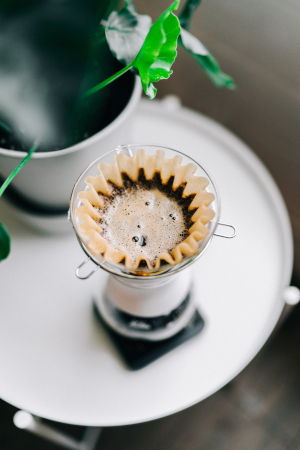Most drip and single serve coffee makers need coffee filters in order to brew coffee. Oftentimes, coffee lovers need to decide between paper filter and metal filter. What is the difference between paper filter vs metal filter? Which one should your machine have? Which one is better, and why? Let’s explore.
This post contains references to products. We may receive compensation when you click on links to those products, at NO charge to you. Please visit this page for our Affiliate Policy.
I have a drip coffee maker, and I need to choose a coffee filter. What is the difference between paper filter vs metal filter? Which one is better? And, why?
Owly Choice reader Jackson
Jackson wants to know which coffee filter will best suit his needs. Many coffee makers require the use of a coffee filter. And, consumers typically choose between paper filters and metal filters. Jackson and many other readers wonder: what are the similarities and differences between a paper filter and a metal filter?
The goal of a coffee filter is to prevent coffee particles from entering a cup of coffee. Very few people want to drink coffee with coffee grounds in their cups. Therefore, paper and metal filters serve to extract coffee and separate coffee grounds from an actual beverage during the brewing process.

However, a coffee filter can also meaningfully impact the strength and actual contents of a coffee beverage. Some coffee filters tend to yield stronger and more robust cups of coffee, while others slightly weaker and less intense. Furthermore, a coffee filter can play an instrumental role in yielding filtered vs unfiltered coffee (and, thus, less or more coffee oils and components).
To adapt to different consumer needs and expectations, manufacturers have designed 2 most popular coffee filters: paper filters and metal filters. While both are very similar, there are also significant differences between paper filter vs metal filter. Each comes with unique benefits and disadvantages.
Paper filter vs metal filter: benefits & cons
Paper filter vs metal filter
Differences paper filter vs metal filter
There are several differences between a paper filter and a metal filter. The major difference is that a paper filter brews filtered coffee, while a metal filter unfiltered coffee. Because a paper filter prevents micro-fines and oils from entering a cup, a paper filter is a better and safer option for people with particular conditions such as high cholesterol (more on this in the article on filtered vs unfiltered coffee).
Furthermore, a paper filter is typically single use only, while a metal filter is reusable. This means that while a paper filter is much easier to clean up, a metal filter can save money in less than a year.
Last, but not least, a paper filter yields much brighter and sweeter coffee, as it filters out heavy coffee oils and other components. Meanwhile, a metal filter results in a darker and more robust coffee drink, as it allows those coffee components to enter a cup.
Similarities between paper filter vs metal filter
Both a paper filter and a metal filter facilitate extraction of coffee grounds, but prevent coffee grounds from entering a cup of coffee. The filter allows coffee grounds and water to interact for a bit longer (as water needs to find its way to drip), but ultimately separates coffee grounds from an actual drink.
Paper filters
A paper coffee filter is typically made of very fine paper material. This paper material comes from quickly growing trees, which are transformed into long fiber. The material allows water to sift through and drip to a cup.
Because of their structure and paper materials, paper coffee filters are typically single use. Thus, we should use paper filters only once, and discard them after each use.
Paper filters brew what is known as filtered coffee. While various people may enjoy paper filters in their coffee brewing, people with certain conditions (such as increased cholesterol) should use paper filters on a regular basis. Why?
Because of the fine materials, a paper coffee filter captures and prevents very small coffee particles such as oils and micro-fines from entering a coffee drink.
Specifically, a paper filter is able to prevent diterpenes from entering a cup of coffee. While diterpenes can have anti-inflammatory properties, they are considered unsafe for people with certain conditions like increased cholesterol levels.
Cost of paper filters
Paper filters cost about 8 cents per brewing. Thus, a coffee lover who enjoys one coffee per day should expect to spend about $30 for coffee filters each year.
Metal filters
On the other hand, a metal coffee filter is typically made with stainless-steel, aluminum or other metals. These materials prevent larger coffee particles from entering a cup of coffee. However, a metal filter is not fine enough, so it allows oils and micro-fines to sift through directly to the cup.
Therefore, metal coffee filters do not filter out diterpenes with anti-inflammatory properties. Coffee lovers who have no medical conditions (like increased cholesterol) will likely enjoy coffee brewed with metal filters.
Metal filters take a bit of time to clean. While some may pose challenges in getting coffee grounds from between the nets, most require a simple wash. However, the major benefit of metal filters is that they are reusable. This reduces carbon footprint on the environment.
Cost of metal filters
Metal coffee filters run anywhere between $10 to $25, depending on the type and size. This means that a metal filter will pay off in less than a year of brewing coffee.
Metal filters are also quite sturdy. Therefore, many coffee lovers continue using metal filters for at least several years.
Owly’s conclusion
Coffee filters can be instrumental in brewing a cup of coffee. There are some differences between paper filters and metal filters, and each coffee aficionado needs to decide which filter to use.
However, there are several recommendations if you should choose paper filter or a metal filter.
Individuals who have certain medical conditions, such as increased cholesterol, should routinely use paper filters. Paper filters filter out oils and fine materials, which yields better filtered coffee. Further, coffee aficionados who prefer sweeter, less intense and brighter coffee would surely enjoy paper filters.
We do not love the environmental footprint of paper filters, since they are single use. However, they are easy to clean, and they typically are made from specific fast-growing trees.
On the other hand, metal filters may surely appeal to people who want to save money. Metal filters are reusable, and they pay off in less than a year of coffee brewing. Furthermore, metal filters may appeal to individuals who love dark and robust coffee, as those filters do not filter out coffee oils and fine materials.
Ultimately, you need to decide what works for you. If you have no conditions, try out metal filters and paper filters, and see what works best for you!
What do you think?
What do you think about paper filter vs metal filter? Which coffee filters will you choose? Do you prefer coffee from paper filters or metal filters?
Let us know in the comments!

Wow, it is very interesting. I have an increased cholesterol. However, I didn’t know I should use paper filters. I am using metal filters from a long time. I will have to change the way of coffee brewing. Thanks Owly.